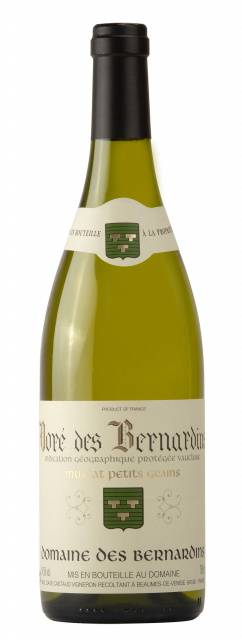Doré des Bernardins 2023

Doré des Bernardins 2023
The Doré des Bernardins is a highly perfumed wine, a dry muscat with unctuous mouth – feel and lenght.
Presentation
The vintageA year of extremes with abrupt climate variations, as we have seen frequently recently.
A very dry winter with only 2 weeks of cold at the end of January, the vines began to bud around March 10. The dry weather persisted until May 12, date when a sudden change in climate with first rain of a long series, who continued until the end of June. This moisture during the most sensitive period for the vines put our teams in the vineyards to the test, requiring a lot of work and attention!
This spring water has been beneficial for the growth and ripening of the grapes during a hot summer, particularly in August and September. The harvest were important after 2 years of small yields. Harvesting began on August 31 for the whites and mid-September for the reds. The harvest tooks place in ideal conditions and promises wines of beautiful maturity and great potential!
Spreads out over the south-east side of the Dentelles de Montmirail hills, in Beaumes de Venise in the southern part of the Rhone valley.
TerroirOn a poor sandy, hungry and arid soil consisting of tender limestone and gritty zones of sandy mollasse.
In the vineyardThe vineyards and their terroir are the essence of our wines. This is where everything starts and where we focus our efforts throughout the year. You can’t make great wine without great grapes.
The viticulture is essentially done by hand. Five people work full-time in the vineyards. They are supplemented by seasonal employees who work during bunch thinning and the harvest in order to bring out the very best in our vines. Working by hand and the attention each vine gets are fundamental. Pruning, de-budding, trellising, leaf removal and picking are thus carried out by hand with the utmost care.
We prepare the soil by using good old-fashioned ploughing. Organic compost is made from grape marc (the discarded stalks and skins).
We use and abide by countrywide standards for ‘sustainable agriculture’.
As a way of protecting the plants, we only use phytosanitary products when necessary and within strict guidelines by staggering the treatments appropriately, to minimise the amount of chemicals used. We prefer to use as much as possible manual and organic techniques. Leaving natural grass cover, removing buds and leaves from the vines, preserving biodiversity around the vineyard: olive, almond and cypress trees, wild rosemary and capers.
Our Doré des Bernardins is a dry white wine that we only produce in years when the Muscat à petits grains crop is large enough. We pick the grapes at the same ripeness level as for the Vin Doux Naturel. In contrast to Muscat de Beaumes, the fermentation isn’t stopped, giving a fruity dry wine with intense Muscat aromas.
Alcohol content14.5
Allergens (sulfites)Contains sulphites
Allergens (egg)Does not contain egg or egg products
Allergens (milk)Does not contain milk or milk-based products
Winegrowing labelAB Agriculture Biologique en conversion, Haute Valeur Environnementale
CépagesMuscat à petits grains blancs : 100 %
Tasting tips
ServingBest drunk within 2 years at 8°C
TastingThe Doré des Bernardins is a highly perfumed wine, a dry muscat with unctuous mouth – feel and lenght.
Food pairingsDelightfully lively and fresh, it would be especially good with seafood such as tuna, shellfish, prawns, or anchovies, with asparagus or vegetables dishes. It will match with basil, coriander, ginger or fennel spiced dishes.
Reviews & awards
- Jean-Luc BARDE
Le Vigneron Magazine , 2024-06-01

"Bien maîtrisé, le muscat sec évite l'exubérance et livre des notes de pêche blanche et de raisin croquant. La bouche nous semble opulente et serait meilleure avec un soupçon de tonicité supplémentaire"
- Olivier Poussier
La Revue du Vin de France , 2024-09-01





